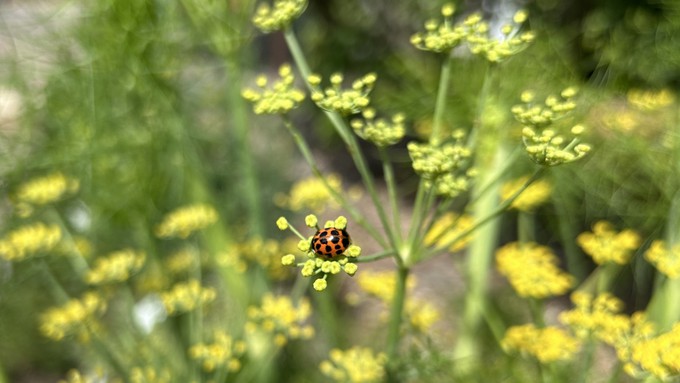
ReScape invites participants to share their landscape dilemmas (and send photos)

Allowing herb plants to flower is one way to attract beneficial insects to a landscape. This lady beetle was drawn to the flowers of a large fennel plant. Find out more during the ReScape webinar. Kathy Morrison
Gardeners have lots of questions – and here’s a great opportunity to get expert answers.
ReScape, partnering with the Sacramento Stormwater Quality Partnership, is planning an interactive Plant Talk Webinar, entitled “Got Questions? Let’s See Them!” Set for 11:30 a.m. Thursday, Feb. 27, the two-hour session is open to the public and will focus on Sacramento-area gardening and landscape issues.
Participation is free, but advance registration is required. In addition, the workshop’s panel would like some real questions from participants. Participants are invited to submit questions (along with up to four photos, drawings or other images) by Feb. 10.
“Send us your most pressing landscaping questions,” say the organizers. “Our regenerative landscaping experts will reply! Whether you’re nurturing a garden, facing a pest invasion, GSI (green stormwater infrastructure) on a corporate campus, or designing a park, we’ll tackle your burning questions and share actionable solutions tailored to the Sacramento region.”
ReScape’s experts plan to tackle some specific topics, too. Among them:
Native Plants – Tips for sustainable beauty.
Tree Planting & Care – Keep them thriving.
Irrigation & Water Savings – Smart watering made simple.
Compost & Mulch – Boost soil vitality naturally.
Lawn/Turf Conversion – Transform your lawn into a vibrant, thriving garden.
Beneficial Insects – Nature’s helpers in your yard.
Soil Health – Building a strong foundation.
Habitat Planting – Nurture pollinators and wildlife.
Non-toxic Pest Management – Protect your plants and the planet.
ReScape is known for its regenerative approach to landscaping, building better gardens by working with nature. Regenerative gardening takes sustainability to the next level. Explains the organization, “Regeneration is proactive and restorative, aiming to create systems that not only sustain but also improve and replenish the environment, communities, and economies.”
To sign up for the webinar: https://shorturl.at/ArXcO
For more on ReScape: https://www.rescapeca.org/
Comments
0 comments have been posted.Sacramento Digs Gardening to your inbox.
Food in My Back Yard Series
May 6: Maintain soil moisture with mulch for garden success
April 29: What's (already) wrong with my tomato plants?
April 22: Should you stock up on fertilizer? (Yes!)
April 15: Grow culinary herbs in containers
April 8: When to plant summer vegetables
April 1: Don't be fooled by these garden myths
March 25: Fertilizer tips: How to 'feed' your vegetables for healthy growth
March 18: Time to give vegetable seedlings some more space
March 11: Ways to win the fight against weeds
March 4: Potatoes from the garden
Feb. 25: Plant a fruit tree now -- for later
Feb. 18: How to squeeze more food into less space
Feb. 11: When to plant? Consider staggering your transplants
Feb. 4: Starting in seed starting
Sites We Like
Garden Checklist for week of May 11
Make the most of the lower temperatures early in the week. We’ll be back in the 80s by Thursday.
* Plant, plant, plant! It’s prime planting season in the Sacramento area. Time to set out those tomato transplants along with peppers and eggplants. Pinch off any flowers on new transplants to make them concentrate on establishing roots instead of setting premature fruit.
* Direct-seed melons, cucumbers, summer squash, corn, radishes, pumpkins and annual herbs such as basil.
* Harvest cabbage, lettuce, peas and green onions.
* In the flower garden, direct-seed sunflowers, cosmos, salvia, zinnias, marigolds, celosia and asters. (You also can transplant seedlings for many of the same flowers.)
* Plant dahlia tubers.
* Transplant petunias, marigolds and perennial flowers such as astilbe, columbine, coneflowers, coreopsis, dahlias, rudbeckia and verbena.
* Keep an eye out for slugs, snails, earwigs and aphids that want to dine on tender new growth.
* Feed summer bloomers with a balanced fertilizer.
* For continued bloom, cut off spent flowers on roses as well as other flowering plants.
* Add mulch to the garden to maintain moisture. Mulch also cuts down on weeds. But don’t let it mound around the stems or trunks of trees or shrubs. Leave about a 6-inch-to-1-foot circle to avoid crown rot or other problems.
* Remember to weed! Pull those nasties before they set seed.
* Water early in the day and keep seedlings evenly moist.